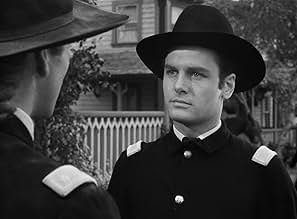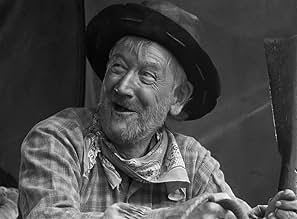IMDb-BEWERTUNG
7,2/10
7080
IHRE BEWERTUNG
Füge eine Handlung in deiner Sprache hinzuA highly fictionalized account of the life of George Armstrong Custer from his arrival at West Point in 1857 to his death at the battle of the Little Big Horn in 1876.A highly fictionalized account of the life of George Armstrong Custer from his arrival at West Point in 1857 to his death at the battle of the Little Big Horn in 1876.A highly fictionalized account of the life of George Armstrong Custer from his arrival at West Point in 1857 to his death at the battle of the Little Big Horn in 1876.
G.P. Huntley
- Lt. 'Queen's Own' Butler
- (as George P. Huntley Jr.)
Joe Sawyer
- Sgt. Doolittle
- (as Joseph Sawyer)
Eddie Acuff
- Cpl. Smith
- (Nicht genannt)
Tod Andrews
- Cadet Brown
- (Nicht genannt)
Handlung
WUSSTEST DU SCHON:
- WissenswertesJim Thorpe, who was an extra, had an off-camera fight with Errol Flynn. With one punch Thorpe knocked out Flynn, who was in his Custer uniform.
- PatzerIn the film George Armstrong Custer argues that there is no gold in the Black Hills, but in reality he led the 1874 expedition that discovered gold near French Creek.
- Zitate
George Armstrong Custer: Walking through life with you, ma'am, has been a very gracious thing.
- Alternative VersionenAlso available in a computer colorized version.
- VerbindungenEdited into Die schwarzen Reiter von Dakota (1952)
- SoundtracksGarryowen
(uncredited)
Traditional military song
Played during the opening and closing credits and as background music aften
Sung in the Monroe bar
Reprised on piano by G.P. Huntley, with the soldiers singing in Ft. Lincoln
Ausgewählte Rezension
All in all, an excellent movie from that time and source (coming from Warner Brothers as it was peaking in craftsmanship and style just before WWII), provided you don't take it at all seriously. The movie really makes no claim to being historically accurate, and is certainly no more or less accurate or believable than say, JFK. (This one may actually be more honest about it, though, as it essentially admits along the way that it's not to be taken as particularly fact-based, but more of a stylishly semi-heroic portrayal.) It's worth noting that audiences of the time were no more naive about the story than we are today; the NY Times review conceded that audiences would "dismiss factual inaccuracies sprinkled throughout the film," described the biographical account of Custer's life as "fanciful," and pointed out that the presentation of Custer's motivations regarding the final events were at odds with various historical accounts. They could have really gone overboard in building up Custer, one supposes, but they succeed admirably in depicting him as not necessarily the sharpest or most diligent guy around, but appropriately determined, principled and inspirational.
Flynn and DeHavilland, doing their 8th movie together in 7 years (and their last), are so comfortable together, and play off each other so easily at this point, that it's not too difficult to overlook how thinly their courtship is written here. With a first-time pairing, it would be hard to imagine what could really draw Elizabeth to Custer, but these two make it work. The movie is also missing their director from their previous seven films together (the greatly underrated Michael Curtiz), but given that he had worked with them on the previous year's similar-themed Santa Fe Trail, it's understandable if he chose to opt out of this one. (They all started together with Captain Blood and The Charge of the Light Brigade - both terrific - so we can't really blame them if they started having a tough time keeping it all fresh.)
Raoul Walsh, the director here, is certainly more comfortable with the action sequences - which are outstanding - and everything else outdoors. The interior scenes are a little more uneven, but the studio craftsmen succeed in compensating for that very well, as does Warner Bros' outstanding cast of "usual suspects" and new faces (Greenstreet, Gene Lockhart, Anthony Quinn, Arthur Kennedy, etc). I would have liked it better if Kennedy's character had been a bit less standard (I generally like his work), but here he seems to be hitting roughly the same notes in every scene; the part could have been better written - and I suppose they might have been unsure of what he could handle, as he'd only been in films for one year (Walsh probably took him for this after doing High Sierra together).
Various highlights include the depiction (probably imagined) of the genesis of "Garryowen" as the cavalry theme. The last half hour is particularly outstanding, especially with the parting of the leads echoing the end of their screen partnership, followed by the final battle scenes. A thoroughly rousing adventure.
8 of 10
Flynn and DeHavilland, doing their 8th movie together in 7 years (and their last), are so comfortable together, and play off each other so easily at this point, that it's not too difficult to overlook how thinly their courtship is written here. With a first-time pairing, it would be hard to imagine what could really draw Elizabeth to Custer, but these two make it work. The movie is also missing their director from their previous seven films together (the greatly underrated Michael Curtiz), but given that he had worked with them on the previous year's similar-themed Santa Fe Trail, it's understandable if he chose to opt out of this one. (They all started together with Captain Blood and The Charge of the Light Brigade - both terrific - so we can't really blame them if they started having a tough time keeping it all fresh.)
Raoul Walsh, the director here, is certainly more comfortable with the action sequences - which are outstanding - and everything else outdoors. The interior scenes are a little more uneven, but the studio craftsmen succeed in compensating for that very well, as does Warner Bros' outstanding cast of "usual suspects" and new faces (Greenstreet, Gene Lockhart, Anthony Quinn, Arthur Kennedy, etc). I would have liked it better if Kennedy's character had been a bit less standard (I generally like his work), but here he seems to be hitting roughly the same notes in every scene; the part could have been better written - and I suppose they might have been unsure of what he could handle, as he'd only been in films for one year (Walsh probably took him for this after doing High Sierra together).
Various highlights include the depiction (probably imagined) of the genesis of "Garryowen" as the cavalry theme. The last half hour is particularly outstanding, especially with the parting of the leads echoing the end of their screen partnership, followed by the final battle scenes. A thoroughly rousing adventure.
8 of 10
Top-Auswahl
Melde dich zum Bewerten an und greife auf die Watchlist für personalisierte Empfehlungen zu.
- How long is They Died with Their Boots On?Powered by Alexa
Details
Box Office
- Budget
- 2.200.000 $ (geschätzt)
- Laufzeit2 Stunden 20 Minuten
- Farbe
- Seitenverhältnis
- 1.37 : 1
Zu dieser Seite beitragen
Bearbeitung vorschlagen oder fehlenden Inhalt hinzufügen

Oberste Lücke
By what name was Sein letztes Kommando (1941) officially released in India in English?
Antwort





































